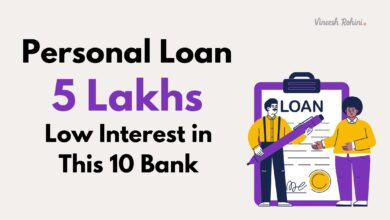Debt Consolidation Loan in India: A Comprehensive Guide
In today’s fast-paced world, managing multiple debts can be overwhelming and financially challenging. Debt consolidation loans offer a practical solution to simplify debt management and regain control over one’s finances. This essay aims to provide a detailed understanding of debt consolidation loans in the Indian context. We will explore what debt consolidation loans are, their benefits, eligibility criteria, the application process, and considerations for individuals seeking to consolidate their debts in India.
- Understanding Debt Consolidation Loans: Debt consolidation loans are financial tools designed to help individuals simplify their debt repayment process. It involves combining multiple debts, such as credit card balances, personal loans, or other outstanding obligations, into a single loan. By consolidating debts, borrowers can streamline their repayments, reduce interest rates, and achieve greater financial stability.
- Benefits of Debt Consolidation Loans: Debt consolidation loans offer several benefits for individuals in India:
a. Simplified Repayment: Consolidating multiple debts into a single loan simplifies the repayment process. Instead of managing various payment due dates and creditors, borrowers have to focus on one monthly installment.
b. Lower Interest Rates: Debt consolidation loans often come with lower interest rates compared to credit cards and other high-interest loans. By securing a lower interest rate, borrowers can save money on interest payments over the loan term.
c. Improved Cash Flow: Debt consolidation loans can improve cash flow by reducing the overall monthly debt obligations. This can provide individuals with more disposable income, making it easier to manage expenses and achieve financial stability.
d. Potential Debt Reduction: In some cases, debt consolidation loans may offer the opportunity to negotiate with creditors and settle debts at a reduced amount. This can lead to significant debt reduction and a quicker path to financial freedom.
e. Simplified Financial Management: With a single loan, borrowers can easily track their progress and manage their finances more effectively. It reduces the chances of missed payments, late fees, and negative impacts on credit scores.
- Eligibility Criteria for Debt Consolidation Loans in India: While specific eligibility criteria may vary between lenders, the following factors are typically considered when evaluating borrowers for debt consolidation loans in India:
a. Age and Citizenship: Borrowers must be Indian citizens and meet the minimum age requirement set by the lending institution, usually 21 years or above.
b. Employment and Income Stability: Lenders assess the borrower’s employment status and income stability to evaluate their ability to repay the loan. Steady employment and a regular source of income increase the chances of loan approval.
c. Creditworthiness: Lenders consider the borrower’s credit history and credit score to determine their creditworthiness. A good credit score indicates a responsible borrowing history, increasing the likelihood of loan approval.
d. Existing Debt Obligations: Lenders assess the borrower’s existing debt obligations, including outstanding loans, credit card balances, and other financial commitments. This helps determine the borrower’s debt-to-income ratio and repayment capacity.
- Considerations for Debt Consolidation Loans in India: Before opting for a debt consolidation loan in India, individuals should consider the following factors:
a. Financial Assessment: Conduct a thorough evaluation of your financial situation, including outstanding debts, interest rates, and repayment terms. Determine whether consolidating debts will lead to long-term savings and improved financial stability.
b. Lender Selection: Research various lenders to find reputable institutions offering favorable interest rates, flexible repayment terms, and minimal processing fees. Compare loan features, terms, and customer reviews to choose the most suitable lender.
c. Loan Repayment Plan: Develop a realistic and sustainable repayment plan to ensure timely payments. Create a budget that considers monthly loan installments and allows for other necessary expenses.
d. Avoid Accumulating New Debts: Consolidating existing debts will only be effective if individuals refrain from accumulating new debts during the repayment period. It is essential to address the root causes of debt and adopt responsible spending habits to avoid falling into the debt trap again.
e. Collateral or Unsecured Loan: Debt consolidation loans can be secured or unsecured. Secured loans require collateral, such as property or investments, while unsecured loans do not require any collateral. Consider the pros and cons of each option based on your financial situation and risk tolerance.
f. Loan Tenure: Evaluate the repayment tenure offered by lenders. While longer tenures may result in lower monthly payments, they can also lead to higher overall interest payments. Choose a tenure that strikes a balance between manageable monthly installments and minimizing interest costs.
g. Impact on Credit Score: Debt consolidation loans can positively impact credit scores if borrowers make timely repayments. However, missed or late payments can adversely affect creditworthiness. It is crucial to prioritize loan payments and maintain a good credit history.
h. Loan Processing Charges and Prepayment Penalties: Understand the processing charges associated with the loan and any prepayment penalties. Compare these charges across lenders and factor them into your decision-making process.
- Application Process for Debt Consolidation Loans in India: To apply for a debt consolidation loan in India, follow these general steps:
a. Research Lenders: Identify reputable lenders offering debt consolidation loans. Consider their interest rates, loan features, and customer reviews.
b. Gather Documentation: Prepare the necessary documents, including identity proof, address proof, income statements, bank statements, and details of existing debts.
c. Loan Application: Complete the loan application form provided by the lender. Ensure all information is accurate and complete.
d. Loan Evaluation: The lender will evaluate your application, including creditworthiness, income stability, and existing debt obligations.
e. Loan Approval and Disbursement: If your application is approved, review the loan terms and conditions offered by the lender. Upon agreement, the loan amount will be disbursed to you.
f. Debt Repayment: Use the loan amount to repay your existing debts. From that point forward, make regular monthly payments towards the consolidated loan.
Conclusion: Debt consolidation loans offer individuals in India an effective strategy to simplify their debt management and regain control over their finances. By consolidating multiple debts into a single loan, borrowers can benefit from simplified repayment, lower interest rates, and improved financial stability. However, it is crucial to consider the eligibility criteria, lender selection, loan terms, and responsible financial practices to ensure a successful debt consolidation journey. With careful planning and discipline, debt consolidation loans can pave the way towards a debt-free future and improved financial well-being.



